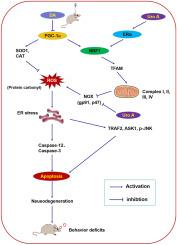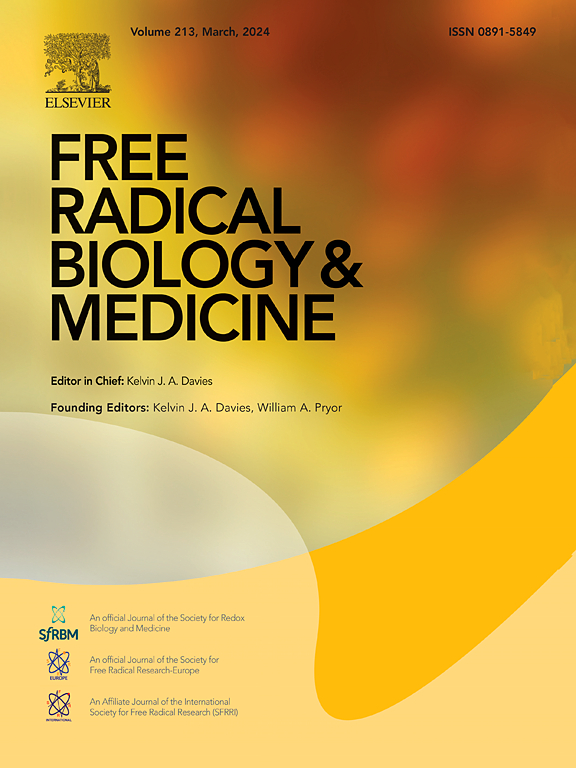Urolithin A protects against domoic acid-induced cognitive deficits via promoting estrogen receptor-α-mediated mitochondrial biogenesis signaling in mice
IF 8.2
2区 生物学
Q1 BIOCHEMISTRY & MOLECULAR BIOLOGY
引用次数: 0
Abstract
Recent studies have indicated that stress in the endoplasmic reticulum (ER) plays a role in the development of domoic acid-induced neurodegeneration. Urolithin A (Uro A) is an active metabolite of the plant polyphenol ellagic acid, which is generated by intestinal flora and offers positive health and biological benefits. Recent research has indicated that anthocyanins possess estrogenic properties and can boost the expression of estrogen receptor-α (ERα). In this study, we examined the effects of Uro A on cognitive deficits resulting from hippocampal mitochondrial dysfunction in mice exposed to domoic acid (DA) and explored the underlying mechanisms. Oral administration of Uro A to the DA-treated mice significantly improved their performance in behavioral tasks, such as step-through passive avoidance, Morris water maze, and open field test. These advancements were, to some extent, driven by the stimulation of mitochondrial biogenesis signaling through estrogen receptor-α and also by lowered expression levels of p47phox and gp91phox. A reduction in reactive oxygen species and protein carbonylation was noted, along with the inhibition of the signaling pathway related to ER stress. Moreover, Uro A greatly reduced ER stress-induced apoptosis, which prevented synaptic damage and restored the expression of memory-related proteins. The partial attenuation of the neuroprotective effects of Uro A in the mice given a combination of Uro A and DA, following the knockdown of ERα via short hairpin RNA, suggests that Uro A exerts its effects via several routes. Our findings imply that Uro A can be used to prevent and treat cognitive deficits associated with excitotoxicity and other brain disorders.

尿素A通过促进雌激素受体-α介导的线粒体生物发生信号传导,保护小鼠免受软骨藻酸诱导的认知缺陷。
近年来的研究表明,内质网应激在软骨藻酸诱导的神经退行性变中起着重要作用。尿素A (Uro A)是植物多酚鞣花酸的活性代谢物,由肠道菌群产生,具有积极的健康和生物学效益。最近的研究表明花青素具有雌激素特性,可以促进雌激素受体-α (ERα)的表达。在这项研究中,我们研究了Uro A对软骨藻酸(DA)暴露小鼠海马线粒体功能障碍导致的认知障碍的影响,并探讨了其潜在机制。口服Uro A可显著改善小鼠在跨步被动回避、Morris水迷宫和开阔场地测试等行为任务中的表现。这些进展在一定程度上是由雌激素受体-α刺激线粒体生物发生信号以及p47phox和gp91phox表达水平的降低所驱动的。活性氧和蛋白质羰基化的减少,以及与内质网应激相关的信号通路的抑制。此外,Uro A显著降低内质网应激诱导的细胞凋亡,防止突触损伤,恢复记忆相关蛋白的表达。Uro A通过短发夹RNA (short hairpin RNA)敲低ERα后,Uro A在小鼠中联合给予Uro A和DA的神经保护作用部分减弱,表明Uro A通过多种途径发挥作用。我们的研究结果表明,Uro A可用于预防和治疗与兴奋性毒性和其他脑部疾病相关的认知缺陷。
本文章由计算机程序翻译,如有差异,请以英文原文为准。
求助全文
约1分钟内获得全文
求助全文
来源期刊

Free Radical Biology and Medicine
医学-内分泌学与代谢
CiteScore
14.00
自引率
4.10%
发文量
850
审稿时长
22 days
期刊介绍:
Free Radical Biology and Medicine is a leading journal in the field of redox biology, which is the study of the role of reactive oxygen species (ROS) and other oxidizing agents in biological systems. The journal serves as a premier forum for publishing innovative and groundbreaking research that explores the redox biology of health and disease, covering a wide range of topics and disciplines. Free Radical Biology and Medicine also commissions Special Issues that highlight recent advances in both basic and clinical research, with a particular emphasis on the mechanisms underlying altered metabolism and redox signaling. These Special Issues aim to provide a focused platform for the latest research in the field, fostering collaboration and knowledge exchange among researchers and clinicians.
 求助内容:
求助内容: 应助结果提醒方式:
应助结果提醒方式:


